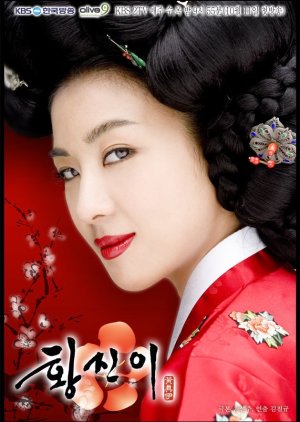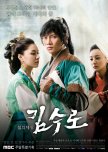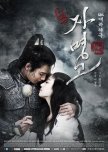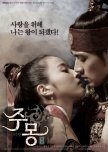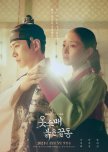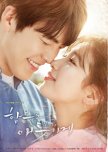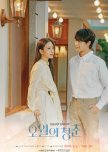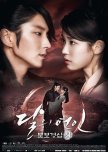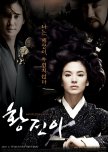
Done around the same time period, 2006-2007, both shows are different retellings of Hwang Jin Yi. If you want to focus more on Hwang Jin Yi's talent as a gisaeng, as well as colorful costumes, then you might want to watch the T.V. series. If you want to watch a depiction much closer to her real life (according to some people), you can watch the movie. It's good if you watch both though, as both shows depict two different views of the modern world on the historical Hwang Ji Ni and the impact of her charms and talents to the modern world.
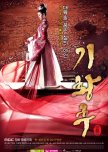
If you admire Ha Ji Won in beautiful historical costumes, as well as portraying complex characters, then Hwang Jin Yi (2006 drama) is a must watch.
Similiarities:
=> actress Ha Ji Won
=> Ha Ji Won characters undergoes a lot of training to become a beautiful woman
=> The beautiful costumes that shows Ha Ji Won's characters' beauty
=> story is both about a woman who has to overcome the pain in her lovelife to become the best as she can be
=> Not really the same but can be comparable: If Empress Ki has fighting Ha Ji Won, Hwang Jin Yi has dancing Ha Ji Won
=> the beautiful way in which Ha Ji Won expresses her characters complexities in both dramas.
=> From what I know, these are the dramas that gave Ha Ji Won her Daesang (grand award) for the yearly tv station awards (Empress KI-MBC, 2013; Hwang Jin Yi-KBS 2006).
Similiarities:
=> actress Ha Ji Won
=> Ha Ji Won characters undergoes a lot of training to become a beautiful woman
=> The beautiful costumes that shows Ha Ji Won's characters' beauty
=> story is both about a woman who has to overcome the pain in her lovelife to become the best as she can be
=> Not really the same but can be comparable: If Empress Ki has fighting Ha Ji Won, Hwang Jin Yi has dancing Ha Ji Won
=> the beautiful way in which Ha Ji Won expresses her characters complexities in both dramas.
=> From what I know, these are the dramas that gave Ha Ji Won her Daesang (grand award) for the yearly tv station awards (Empress KI-MBC, 2013; Hwang Jin Yi-KBS 2006).

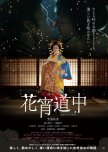
The New Yoshiwara pleasure district, in the twilight years of the Edo Period. Popular prostitute Asagiri will soon be freed from her indentured service. One day at a local festival, she meets young artisan Hanjiro who changes her destiny. Asagiri feels love for the first time in her life, but the history involving Hanjiro's client leads to tragic circumstances.
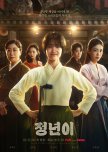
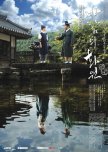
Both are Joseon period dramas about a woman's struggles to become a great artist. I really love both dramas because both plots explain the characters very well through the use of their art forms. Both dramas also feature a beautiful and talented gisaeng played by two great actresses (though the gisaeng in Painter of the Wind is NOT the lead female). A scene I find quite similar in both dramas is both feature a scene wherein the gisaeng is playing the gayageum instrument while her lover (in Painter of the Wind, this lover is the female lead) is painting as the lover listens to her music.
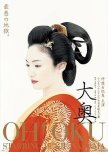
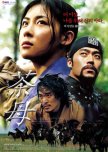
Both are Joseon period dramas starring Ha Ji Won. Both also happen to be underrated historical dramas of hers in comparison to Empress Ki. I watched both these dramas next to each other and became an instant fan of Ha Ji Won. Who could imagine that the graceful Ji Ni can also be the action queen Chae Ok?
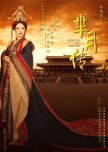
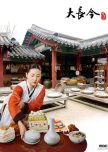
Both feature talented women who chases their dreams despite living in a patriarchal society. They both enter an institution where they were both trained by a woman who were initially strict but whom they eventually learned to love and respect. Because of their talents, both became known in her institution, even the king offering something for her. They both had bitter rivals, jealous of their talents and even obsessed with their lovers. Both overcame a lot of hardships to became well known in their institutions. Their choices of how they live their lives in the end can be a surprise.
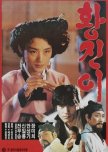
?Similarities:
• Both dramas seek to adapt the life of Hwang Jin Yi, a famous gisaeng;
• There were 3 men involved in the lives of the two protagonists, romantically or not, they had some impact.
• Sacrifices and tragedies. Both suffered a lot throughout their lives, sacrificing their dignity and losing their shine.
That said, it's up to you to decide if you think it's worth it. Particularly, nothing beats the 2006 series for me.
• Both dramas seek to adapt the life of Hwang Jin Yi, a famous gisaeng;
• There were 3 men involved in the lives of the two protagonists, romantically or not, they had some impact.
• Sacrifices and tragedies. Both suffered a lot throughout their lives, sacrificing their dignity and losing their shine.
That said, it's up to you to decide if you think it's worth it. Particularly, nothing beats the 2006 series for me.

